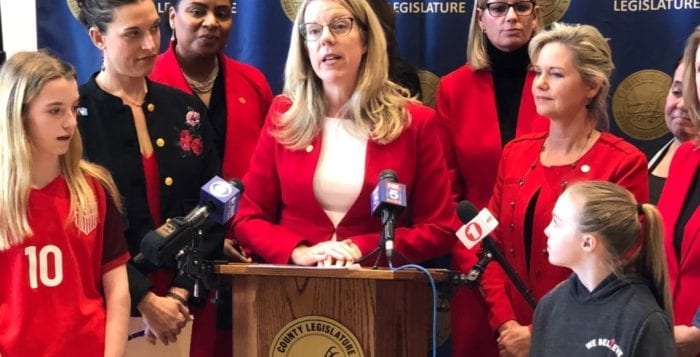Editorial: Time to RISE
While the U.S. women’s soccer team waits to enter mediations regarding the discrepancy between their pay and the men’s team’s earnings, Suffolk County women, as well as racial and ethnic minority workers, are about to enter a more even playing field when they decide to apply for a new job starting June 30 thanks to a new law.
We say it’s about time.
Historically, women along with racial and ethnic minority workers have earned lower than average wages. Before passing the law, the county Legislature used an April 2018 New York State Department of Labor report that found women in the county earn 78 percent for what their male counterparts earn. The statewide percentage is 87. The same report cited that in New York African American or black women earn 64 percent and Latino or Hispanic women earn 53 percent of what men earn.
 The Legislature recently decided to do something about the injustice by creating a local law, called the RISE (Restrict Information Regarding Salary and Earnings) Act, to restrict divulging earnings history during the interview process. County Executive Steve Bellone (D) signed the legislation into law in November.
The Legislature recently decided to do something about the injustice by creating a local law, called the RISE (Restrict Information Regarding Salary and Earnings) Act, to restrict divulging earnings history during the interview process. County Executive Steve Bellone (D) signed the legislation into law in November.
This means when a Suffolk County resident searches for a new job, they will not be haunted by their last salary. Now, employers and employment agencies cannot ask for salary history on applications or during interviews.
In addition to women and minority workers being offered less in the past, there are also cases where people have been out of work for a long time — whether due to layoffs, taking care of children or a sick relative — who take the first job they are offered, regardless of pay just to get back on track careerwise.
This can cause problems when they apply for a job and the company asks for their salary history. The job applicant might be offered a salary below the range the employer was originally thinking. The employer may see it as an opportunity to save money, thinking if the applicant got by on their last wage, why would they need much more.
But no more. Now employers have to decide how much they believe a job is worth, then offer that salary. And while it makes sense that there may be a salary range based on experience, it also makes sense to pay people similar pay for doing the same job.
And the law benefits more than women and ethnic and racial minority workers; it even helps those who are leaving a high-paying position. In the past, if someone wanted to travel down a different career path, they may have been willing to accept a lower salary. But a company may not have called them for an interview when they saw how much they made at previous jobs, thinking they wouldn’t take a lower salary.
In the end, the new law may even help the local economy. With more money in women’s bank accounts, they will have more buying power or the opportunity to escape from dysfunctional relationships and get a place of their own.
Confirmed with a bipartisan, unanimous vote, the Suffolk County Legislature apparently believes the RISE Act will help break the cycle of wage discrimination in the area. We agree, and we say to those who have felt stuck in their financial situation that now is the time to RISE and shine.







